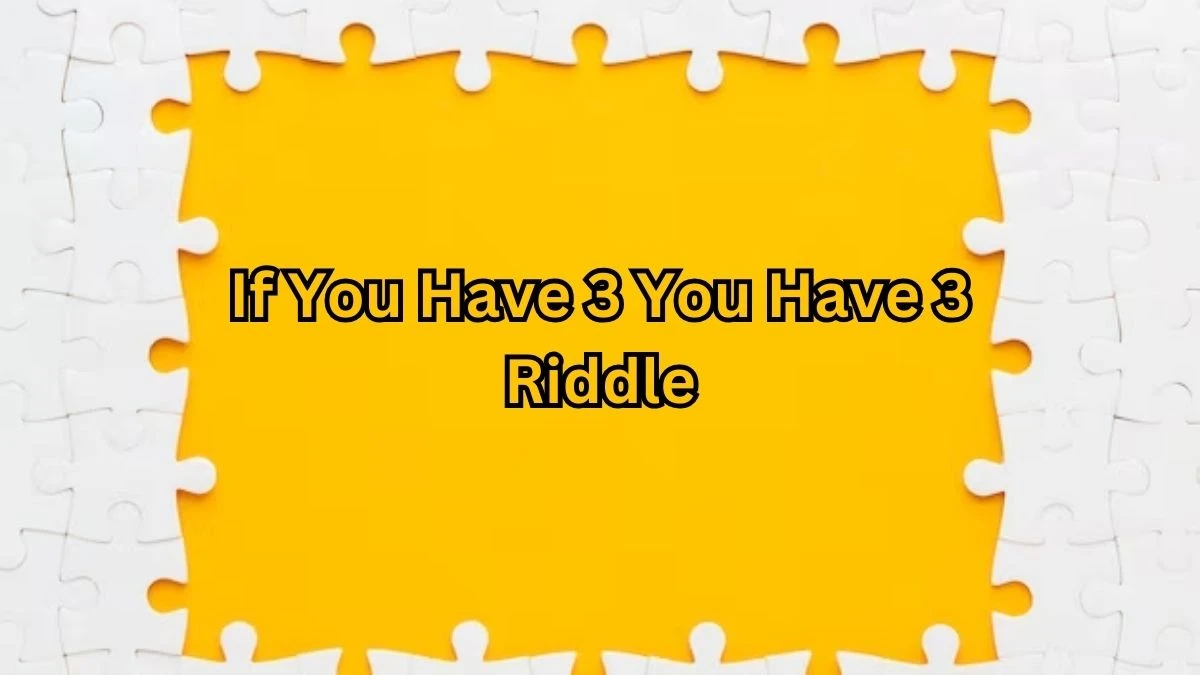- Rojgarlive »
- Riddle »
- If You Have 3 You Have 3 Riddle and Answer
If You Have 3 You Have 3 Riddle and Answer
by S Samayanka
Updated Feb 14, 2024

If You Have 3 You Have 3 Riddle
Are you up for a thrilling adventure filled with mind-bending puzzles and enigmatic mysteries? Prepare to embark on a journey into the depths of your imagination as these riddles ignite your curiosity. We welcome you to delve into a realm where words transform into tantalizing challenges, where wit and intellect collide, and where the excitement of unraveling secrets awaits.
Moreover, tackling riddles offers more than just amusement; it's an opportunity for personal growth. Solving these conundrums enhances your cognitive abilities by sharpening skills like critical thinking, pattern recognition, and problem-solving.
Now, let's delve into a riddle together: This cunning puzzle presents a scenario that may initially appear unsolvable, guaranteed to pique your interest. As you ponder the question, consider thinking creatively and exploring unconventional approaches
Riddle: If You Have 3, You Have 3.
If You Have 2, You Have 2.
But if You Have 1, You Have 0.
What Am I?
If You Have 3 You Have 3 Riddle Answer
The answer to the riddle "If You Have 3, You Have 3" is "Choice." This abstract answer reflects the concept that having multiple options allows for choice, while having only one option leaves no room for decision-making.
When you have three choices, you indeed have three options to consider. Similarly, with two choices, you have two possibilities to choose from. However, the confusion arises when it's stated that if you have one choice, you have none. This might seem paradoxical, but it highlights that having only one option means there's no alternative; the decision is predetermined.
The riddle emphasizes the significance of having options and the absence of choice when there's only one possibility. Understanding the various meanings of "choice" clarifies the riddle's solution, showcasing the importance of critical thinking and interpretation in problem-solving.
Answer: Choice
What is Riddle?
A riddle is a form of enigmatic expression that challenges the intellect and encourages creative thinking. It typically presents a puzzling question or problem, often in a metaphorical or allegorical manner, with the goal of teasing out a clever and unexpected answer.
Riddles have been an integral part of human cultures throughout history, serving as a source of entertainment, mental stimulation, and sometimes even educational tools. They exist in various forms, from verbal puzzles to written or visual conundrums. Riddles often require lateral thinking, as they demand individuals to approach problems from unconventional angles to arrive at a solution.
In essence, a riddle is a playful and imaginative exercise that invites individuals to engage their cognitive abilities, fostering a sense of curiosity and the joy of unraveling mysteries. Whether used for amusement, social interaction, or intellectual development, riddles endure as timeless expressions of human ingenuity and the universal desire for mental challenges.
Benefits of Solving Riddle
- Mental Exercise: Engaging with riddles provides a mental workout, enhancing cognitive abilities and boosting critical thinking and problem-solving skills.
- Language Development: Riddles, often filled with wordplay and clever language usage, contribute to the enrichment of vocabulary. Regular exposure improves linguistic creativity and proficiency.
- Cultivation of Creativity: The process of unraveling riddles encourages thinking outside conventional boundaries, fostering creativity and imaginative thinking.
- Entertainment and Social Interaction: Solving riddles is an enjoyable activity, offering entertainment and amusement. It can be a social experience, promoting interaction and friendly competition.
- Educational Insights: Riddles often convey cultural or historical insights, serving as a playful means to learn about language, traditions, and societal aspects. They can be incorporated into educational settings for engaging learning.
- Confidence Building: Successfully solving challenging riddles instills a sense of accomplishment, boosting self-confidence, and encouraging perseverance when faced with mental challenges.
- Memory Enhancement: Recalling information from riddles contributes to memory improvement. The mental effort involved in solving them strengthens memory retention.
- Logical Reasoning Development: Riddles typically follow a logical structure, guiding individuals through a sequence of thoughts or deductions. This aids in the development of logical reasoning skills.
If You Have 3 You Have 3 Riddle - FAQs
A riddle is a puzzling question or problem that challenges the intellect, often presented in a metaphorical or allegorical manner.
The answer reflects the concept that having multiple options allows for choice, while having only one option leaves no room for decision-making.
It highlights the significance of having options and the absence of choice when there's only one possibility, showcasing the importance of critical thinking.
Mental exercise, language development, cultivation of creativity, entertainment, social interaction, educational insights, confidence building, memory enhancement, and logical reasoning development.
By enhancing cognitive abilities, boosting critical thinking, improving language skills, fostering creativity, providing entertainment, and promoting social interaction and confidence.




